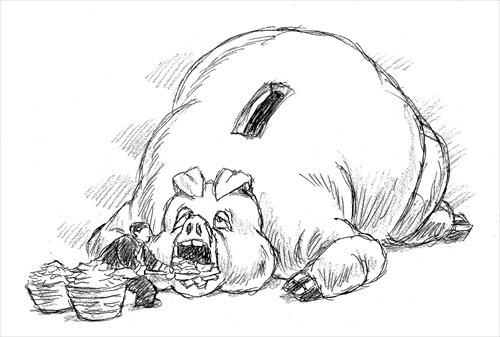Pro-growth policies are still needed in China

Illustration: Peter C. Espina/GT
When speaking of boosting economic growth in China, one can hardly avoid discussing the 4 trillion yuan ($643.71 billion) stimulus package unveiled in 2008. The plan allowed China's economy to avoid the worst effects of the global financial crisis, but it also caused some unwanted side effects - industrial overcapacity, inflation and spikes in asset prices. As a result, a bombardment of criticism toward the plan swung public opinion and has to some extent hindered the government's attempts to bolster the economy since then.
Despite stronger-than-expected economic data in March, official and private factory surveys released this week showed that economic expansion slowed in April. Given the upward momentum is still far from being sustainable, stabilizing economic growth remains a top priority for Chinese policymakers. It is thus necessary to assess the pros and cons of the 4 trillion yuan stimulus plan rationally and identify the areas that need to be improved in order to offer guidance for policymaking at present.
We need to be clear that the benefits of the package outweighed the negative effects. Some people are opposed to any form of pro-growth policies due to the side effects of the 4 trillion yuan plan. Some have even attributed all the problems currently facing the Chinese economy to the launch of the plan. This is not fair. We need to be aware that the US subprime crisis was the main culprit for dragging the global economy into the mire. The stimulus plan enabled China's economy to weather the crisis and its position in the world economy has risen since then. The country's prolonged economic slowdown in the last two years has convinced more and more people that various problems may escalate without solid pro-growth policy support, which would mean that economic restructuring would only be empty talk.
Therefore, the key issue at the policy level is not about whether we need stimulus or not, but about how we should optimize policies to reduce the side effects and avoid sacrificing long-term sustainability. In this sense, there are some lessons to learn from the stimulus plan.
First, stabilizing the economy needs sustainable and steady efforts. Any abrupt policy move would amplify economic swings. At the end of 2008, the sudden roll-out of the 4 trillion yuan stimulus quickly raised expectations for the economic outlook. Under the support of the loose monetary policy at the time, many factories not only reopened but also expanded production. However, the rapid exit of the plan in 2010 thwarted the expectations of the optimists and caused a great deal of capacity to become redundant before it even went into operation. At the same time, the tightening of monetary policy further added to the companies' woes, accentuating economic volatility. Therefore, new pro-growth policies should be steady. Only in this way can we stabilize market expectations and ensure sustainable economic growth.
Second, industrial capacity should not be further expanded. The financial crisis has dampened global demand. Against this backdrop, China will face pressure from industrial overcapacity for quite a long time. Since the 4 trillion yuan stimulus inappropriately boosted investment in China's manufacturing industry, it made the overcapacity problem even worse. China should not pump up investment in production-oriented industries such as manufacturing, but should raise investment in consumer-oriented sectors such as infrastructure instead. It is also advisable to support consumption through tax breaks and policies to improve the social security net.
Third, we should rely more on fiscal policies to stabilize the economy to avoid the side effects from pumping excessive liquidity into the market. During the time when the 4 trillion yuan stimulus plan was in effect, loose monetary policy was the key tool for supporting the economy. Back then, policymakers expected to encourage firms to increase investment and expand production through credit.
However, the large amount of credit did not flow to the real economy but to the property and financial industries instead, pushing up inflation and asset prices. Therefore, China should rely more on policies such as fiscal policy that will not lead to monetary expansion and can support the real economy.
These three points have to some extent been reflected in the existing pro-growth policies. In the future, Chinese policymakers should make greater efforts to optimize these policies and seek new ways to allow the economy to grow along a more sustainable path.
The author is chief economist at China Everbright Securities Co. The Chinese version of the article was first published by the Economic Information Daily. bizopinion@globaltimes.com.cn